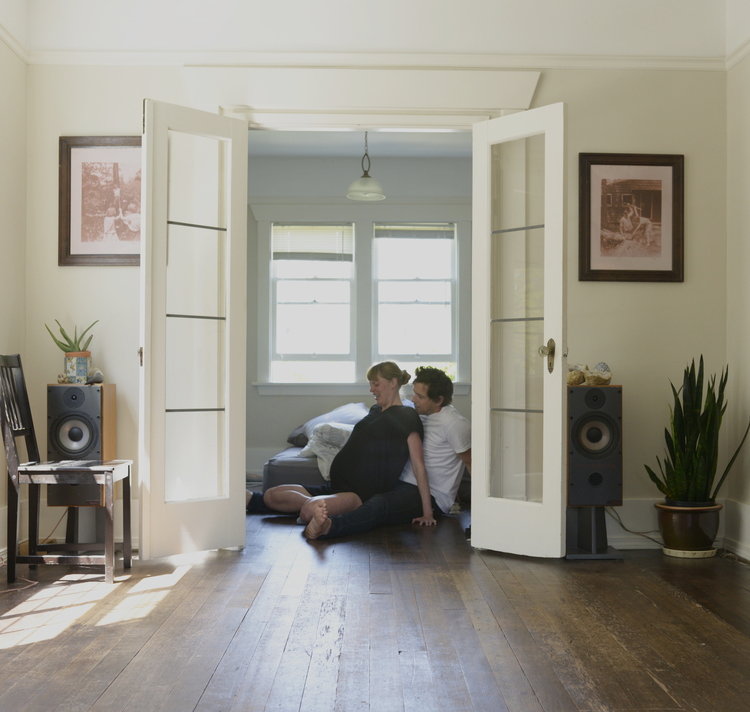Leaking When You Laugh Is Not Normal
The Truth About Postpartum Incontinence
Guest Post By: Kim Vopni, Fitness Doula
The new mom community is a strong one. Playdates, Mom and Baby Fitness Classes, walks in the park – new moms everywhere are connecting in a variety of ways to share stories and bond through the spit ups, the sleepless nights and the struggles to determine which baby carrier is best. Conversations typically revolve around the children, marking milestones, demonstrating new habits, and sharing laughs about the joys of motherhood.
The trouble is, most of these moms are leaking when they laugh. They leak again as they pick up their baby to get him out of harm’s way and they leak again when they perform the jumping jacks and ‘core work’ in the mommy bootcamp class that afternoon. So they start wearing pads to help protect their undies from those leaks and they start to go to the bathroom a little more often in hopes of minimizing the leaks. They don’t notice much improvement so they start drinking less thinking that with less fluid in the bladder it won’t leak as much. They still don’t notice much improvement so decide to confide in a friend. The friend giggles (and leaks) and says ‘its totally normal after you’ve had kids. My mom still leaks so guess we just have to get used to it.’ And so they carry on wearing pads, emptying their bladders often and drinking less while trying to ignore the problem.
Incontinence after birth is more common than you think – common but not normal. Leaking when you laugh or cough or sneeze or run or jump or squat is not normal and by restricting fluids and voiding more often you will actually make the problem even worse.
Types of Incontinence after Birth
There are different types of incontinence after birth, with Stress Urinary Incontinence (SUI) and Urge Incontinence being the most common. SUI is classified as the involuntary loss of urine upon exertion such as coughing or sneezing or running. Urge incontinence is classified as an intense urgency to void even with a bladder that is not completely full. SUI can be from weak pelvic floor muscles that are underused but it can also develop from chronically contracted muscles that become weak from overuse. A healthy, functional pelvic floor has a balance between the ability to contract and the ability to relax. A pelvic floor that is too relaxed or contracts too much is dysfunctional and needs to be addressed.
It seems logical to drink less water – less liquid means less peeing – sounds logical but by restricting your water intake your urine will become more concentrated which will then irritate the bladder which will then increase the urgency and frequency.
Urge Incontinence After Birth
Urge incontinence may come about from nerve damage sustained during pregnancy or childbirth. It may also develop from unhealthy elimination habits. Remember the mom who started to go more often to try and prevent leaks? By emptying your bladder before it is full you will start to interfere with the messaging between your brain and the bladder. The bladder will start to send “I’m full’ signals to the brain more often and sooner than it should and you begin making plans around where you will be able to go to the bathroom and avoiding activities in which you aren’t able to go to the bathroom often. A healthy bladder eliminates between 5 – 9 times a day and no more than once at night. Typically every 2-4 hours is how often you should pee. Drinking caffeinated beverages, ingesting products with artificial sweeteners, acidic foods and alcohol can irritate the bladder and make you go more often so avoiding them can help control the urgency and reduce the frequency. It seems to logical to drink less water – less liquid means less peeing – sounds logical but by restricting your water intake your urine will become more concentrated which will then irritate the bladder which will then increase the urgency and frequency.
SUI Incontinence After Birth
SUI responds well to pelvic floor exercise, posture adjustments and breath work. The type of exercise will be dependent on if the muscles are weak from underuse or weak from overuse. The standard go-to exercise is the kegel but not many women know how to do them correctly and for women whose pelvic floor is weak from overuse, kegels will only make their situation worse.
Taking Control of Incontinence After Birth
So what’s a mom to do? Walk, don’t run, to your nearest pelvic floor physiotherapist in Vancouver (you can find one here) and start on a core restoration plan. Didn’t know the pelvic floor was part of the core did you? Now you do and with that knowledge you will become more aware of the activities that are core friendly and those that are not (a little hint here… crunches are one of least core friendly exercises out there so avoid them like artificial sweeteners!)
Leaking when you laugh is not normal and there are many options for you that can help. Lifestyle changes, avoiding the activities that cause you to leak (I know you can’t avoid coughing and sneezing and laughing but the high impact stuff you can do away with for the time being…) and seeking the help of a professional trained in deep core function will put you back on the path to pelvic floor wellness. Please share this information with all the mommies you know!
Kim Vopni holds a Post Graduate Diploma in Health and Fitness from Simon Fraser Unversity. She is a Certified Personal Trainer and Certified Pre/Post Natal Fitness Consultant. She is also a trained postpartum doula. She offers Postpartum Fitness Assessments and Core Restoration Seminars in Vancouver, BC.
If you are suffering from incontinence after birth and want to stop leaking when you laugh, contact Kim Vopni for more info.
Did you suffer from incontinence after birth? What helped you? Comments welcome below!
Click here to return from The Truth About Postpartum Incontinence to our homepage.

